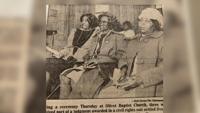After being shot by KKK members in April of 1980, five black Chattanooga women ultimately brought justice to those who faced centuries of harm and changed how civil cases would be tried.
"When I met them they had over 100 shotgun pellets still in their legs," explained New York Attorney Randolph McLaughlin, who represented Viola Ellison, Lela Mae Evans, Katherine Johnson, Opal Lee Jackson, and Fannie Mae Crumsey.
READ MORE | PART 1: The history and legacy of the Chattanooga Five
He said birdshot pellets are so small doctors could not surgically remove them.
"It just goes into your skin and into your muscle and eventually your body pushes it out of your skin and it just pops out, that is extremely painful."
McLaughlin was hired by the head of the NAACP to represent the five women in their civil case against the three Ku Klux Klan members. Though it was not an easy feat, McLaughlin said it took two years before they went to trial.
"Normally when an out of state lawyer like me handles a case in another city, you have a local lawyer who's in the city that you're trying the case who assists you and does a lot of the work. We had no local lawyers in Chattanooga. Not one lawyer in the city of Chattanooga, black or white, would come on these papers with us and help us file this lawsuit."
He and his team were able to get former Memphis Mayor A.C. Wharton, who was a lawyer at the time, to sign on to the complaint.
On February 19, 1982, the Crumsey V. The Justice Knights of the Ku Klux Klan trial case began.
"It was the first time the Klan was sued in Civil court under the civil rights statue passed in 1871."
After 8 long days of trial, the women won their civil case against the Klan.
"I don't think they were too hopeful that we were going to win this case. But when we won, they were overjoyed. So were we because we knew that we had created a precedent that future lawyers and future litigants, future victims of Klan violence could use to sue them for money."
The women were awarded $535,000 and the judge issued an injunction that prohibits the Klan from engaging in any action of violence in Chattanooga.
"And I'm told that to this very day, that's 40 years, there's not been one incident of Klan violence in Chattanooga, and I attribute that to the work we did there and the work the women did by standing up to these terrorists and fighting back," McLaughlin said.
The case became a landmark and sparked civil cases across the south.
"After we sued, other groups sued similarly all across the south and shut down the Klan, the Klan was essentially run out of business."
More than 40 years later, the case still serves as a model for lawyers like Civil Rights Attorney Ben Crump in the fight against racial violence.
"In our cases where the young white supremacist shot up the Buffalo New York Tops supermarket, they're using it in Charlottesville, North Virginia, where a young lady was killed. They're using it also in the case of the Mt. Moriah Missionary Church where Dylan Roof went and shot up those nine black people in a church," said Crump.
"A group of congressmen and folks in D.C. sued the insurrectionists under the Ku Klux Klan Act, they used the same statue," added McLaughlin.
"All of these cases are being successfully litigated today because of what the Chattanooga Five did yesterday," said Crump.
Chattanooga Film Director John Beder is not letting their story go untold.
"I think over the years people have tried to document the story and the civil case in some iteration, but there wasn't a documentary and that felt like an injustice," said Beder.
He spent four years creating the documentary "How to Sue the Klan." When Attorney Crump heard about the documentary he signed on as a producer of the film in hopes to use it as a call to action.
"The fact that they said, 'it doesn't matter how many death threats you give me, we're going to pursue justice.' What an example for our young people. We're going to fight for truth and that is now more than ever what our young people need to see in 2024."
On February 9, 2024, "How to Sue the Klan" premiered to a crowded room inside the Walker Theater, bringing the legacy of the Chattanooga Five to the silver screen.
"So, we're hoping that people walk away with an understanding of what happened, an appreciation of the women, and some genuine curiosity as to maybe how they can get involved, how they can share the story, what other history does Chattanooga have that may have been overlooked or haven't spent time shining a light on," said Beder.
It's something the Crumsey family said they are grateful for.
"Just to hear her voice again. John and Tiffany, they did a great job," said Ronald Crumsey, the grandson of Fannie Mae Crumsey.
"It brought back a lot of memories. The film and the truth has finally come out and before long the whole world will know that's one thing I think my grandmother would be proud of and very humbled to know that their story is not being pushed and forgotten," said Nathaniel Metcalf, grandson of Fannie Mae Crumsey.
The Crumsey family started the Fannie Mae Crumsey Foundation to continue her legacy in bringing love and unity to Chattanooga. The faces of the five women are painted on a mural downtown and they are pushing for a statue in Miller Park.
The documentary "How to Sue the Klan" is being shown around the world and even to Vice President Kamala Harris.
If you're interested in attending or booking a screening of the documentary, click here.













